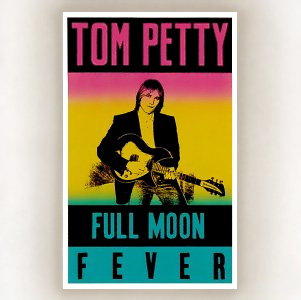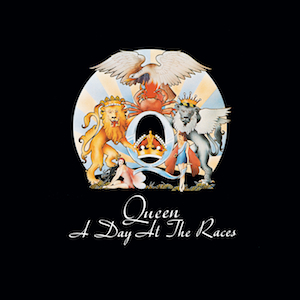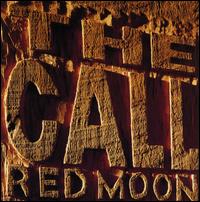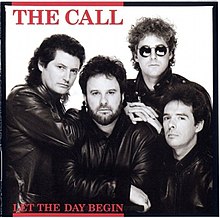
The Call is an American rock band formed in Santa Cruz, California, in 1980. The main lineup consisted of members Michael Been, Scott Musick, Tom Ferrier, and Jim Goodwin. The band released nine studio albums over the next two decades before disbanding in 2000. Their 1986 song, "I Still Believe ", was covered by Tim Cappello and included in the 1987 film The Lost Boys. The band also achieved significant success in 1989 with "Let the Day Begin", which reached No. 1 on the Billboard U.S. Mainstream Rock chart and was later used as a campaign theme song for Al Gore's 2000 Presidential Campaign.

Full Moon Fever is the debut solo studio album by American musician Tom Petty, released on April 24, 1989, by MCA Records. It features contributions from members of his band the Heartbreakers, notably Mike Campbell, as well as Jeff Lynne, Roy Orbison, and George Harrison, Petty's bandmates in the Traveling Wilburys. The record showcases Petty exploring his musical roots with nods to his influences. The songwriting primarily consists of collaborations between Petty and Lynne, who was also a producer on the album. Full Moon Fever became a commercial and critical success, peaking at No. 3 on the U.S. Billboard 200 and being certified 5× platinum in the United States and 6× platinum in Canada.
Nitty Gritty Dirt Band, known as the Dirt Band from 1978 to 1983, is an American band founded in Long Beach, California, in 1966. Since 2018, the band has consisted of Jeff Hanna and his son Jaime Hanna, both guitarists and vocalists, along with Jimmie Fadden, Bob Carpenter, Ross Holmes, and Jim Photoglo.

Vincent Grant Gill is an American singer, songwriter, and musician. He began in a number of local bluegrass bands in the 1970s, and from 1978 to 1982, he achieved his first mainstream attention as lead singer of the soft rock band Pure Prairie League. Gill sang lead on their hit single "Let Me Love You Tonight" in addition to writing several songs of theirs. After leaving Pure Prairie League, Gill briefly played guitar in Rodney Crowell's backing band the Cherry Bombs before beginning a solo career in country music in 1984. Gill recorded for RCA Records Nashville from then until 1988 with minimal success. A year later he signed with MCA Nashville, and he has recorded for this label ever since.

A Day at the Races is the fifth studio album by the British rock band Queen, released on 10 December 1976 by EMI Records in the United Kingdom and by Elektra Records in the United States. Recorded at The Manor, Sarm East, and Wessex Sound Studios in England, it was the band's first completely self-produced album, and the first completed without the involvement of producer Roy Thomas Baker; engineering duties were handled by Mike Stone. It serves as a companion to Queen's previous album, A Night at the Opera, with both taking their names from Marx Brothers films and having similar packaging and eclectic musical themes.

John Marty Stuart is an American country and bluegrass music singer, songwriter, and musician. Active since 1968, Stuart initially toured with Lester Flatt, and then in Johnny Cash's road band before beginning work as a solo artist in the early 1980s. He is known for his combination of rockabilly, country rock, and bluegrass music influences, his frequent collaborations and cover songs, and his distinctive stage dress.

Who Are You is the eighth studio album by the English rock band the Who, released on 18 August 1978 by Polydor Records in the United Kingdom and on 21 August 1978 by MCA Records in the United States. Although the album received mixed reviews from critics, it was a commercial success, peaking at number 2 on the US charts and number 6 on the UK charts.

Southern Accents is the sixth studio album by Tom Petty and the Heartbreakers, released on March 26, 1985, through MCA Records. The album's lead single, "Don't Come Around Here No More", co-written by Dave Stewart of Eurythmics, peaked at number 13 on the Billboard Hot 100. The song "Southern Accents" was later covered by Johnny Cash for his Unchained album in 1996.

Takin' My Time is the third studio album by American musician Bonnie Raitt. It was released in 1973 by Warner Bros. Records. The album is an amalgamation of several different genres, including blues, folk, jazz, New Orleans rhythm and blues, and calypso. The 10 tracks on the album are covers, ranging from soft sentimental ballads to upbeat, rhythmic-heavy tracks. Lowell George was originally hired to handle the production, but was ultimately replaced by John Hall when Raitt became unhappy with his production.

The Traveling Wilburys Vol. 1 is the debut studio album by the English-American supergroup Traveling Wilburys, comprising George Harrison, Jeff Lynne, Bob Dylan, Roy Orbison and Tom Petty. It was released in October 1988 to commercial success and critical acclaim. Although Harrison had long planned to start such a band, the project came about through happenstance. Harrison was in Los Angeles and in need of a B-side for a single from his album Cloud Nine, which resulted in the participants collaborating informally on the song "Handle with Care" at Dylan's home.

Patty Loveless is an American country music singer. She began performing in her teenaged years before signing her first recording contract with MCA Records' Nashville division in 1985. While her first few releases were unsuccessful, she broke through by decade's end with a cover of George Jones's "If My Heart Had Windows". Loveless issued five albums on MCA before moving to Epic Records in 1993, where she released nine more albums. Four of her albums—Honky Tonk Angel, Only What I Feel, When Fallen Angels Fly, and The Trouble with the Truth—are certified platinum in the United States. Loveless has charted 44 singles on the Billboard Hot Country Songs charts, including five which reached number one: "Timber, I'm Falling in Love", "Chains", "Blame It on Your Heart", "You Can Feel Bad", and "Lonely Too Long".

The Monkees is the debut studio album by the American band the Monkees. It was released on October 10, 1966 by Colgems Records in the United States and RCA Victor in the rest of the world. It was the first of four consecutive U.S. number one albums for the group, taking the top spot on the Billboard 200 for 13 weeks, after which it was displaced by the band's second album. It also topped the UK charts in 1967. The Monkees has been certified quintuple platinum by the RIAA, with sales of over five million copies.

Hold an Old Friend's Hand is the second studio album by American singer Tiffany, released on November 21, 1988, by MCA Records. It was produced by George Tobin, who previously worked with Tiffany on her self-titled debut album. Hold an Old Friend's Hand is a teen pop and bubblegum pop album that explores the themes of young adulthood. Musically, the album incorporates elements of pop, rock, funk, disco, dance, and country pop.

Metamorphosis is the third compilation album of the Rolling Stones music released by former manager Allen Klein's ABKCO Records after the band's departure from Decca and Klein. Released in 1975, Metamorphosis centres on outtakes and alternate versions of well-known songs recorded from 1964 to 1970.

Shenandoah is an American country music band founded in Muscle Shoals, Alabama, in 1984 by Marty Raybon, Ralph Ezell, Stan Thorn, Jim Seales, and Mike McGuire. Thorn and Ezell left the band in the mid-1990s, with Rocky Thacker taking over on bass guitar; Keyboardist Stan Munsey joined the line up in 1995, until his departure in 2018. The band split up in 1997 after Raybon left. Seales and McGuire reformed the band in 2000 with lead singer Brent Lamb, who was in turn replaced by Curtis Wright and then by Jimmy Yeary. Ezell rejoined in the early 2000s, and after his 2007 death, he was replaced by Mike Folsom. Raybon returned to the band in 2014. That same year, Jamie Michael replaced the retiring Jim Seales on lead guitar.

Standing on the Edge is the eighth studio album by the American rock group Cheap Trick, released by Epic in 1985. The album was produced by Jack Douglas, the producer of Cheap Trick's 1977 debut album, Cheap Trick. Standing on the Edge reached No. 35 on the Billboard 200 and remained on the charts for 18 weeks.

Volcano is the ninth studio album by American popular music singer-songwriter Jimmy Buffett and is his 11th overall. It was released on August 1, 1979, as his first album for MCA after its absorption of ABC Dunhill.

Riddles in the Sand is the thirteenth studio album by American popular music singer-songwriter Jimmy Buffett. It was released in September 1984 as MCA 5512 and was produced by noted country music producer Jimmy Bowen and represented a concerted shift toward a more country sound by Buffett. He appeared on the album's cover in typical country singer garb and promoted the album at Fan Fair country music festival in Nashville, Tennessee. The album was originally to have been titled Gulf and Western Music reflecting the fusion of musical styles seen in much of Buffett's music often called Gulf and Western music. In the album's liner notes, Jim Harrison says, "This album has a musical range expanding in an arc from Bob Wills to Bob Marley with the Gulf somehow always there."
Evangeline was an American country music band initially composed of Kathleen Stieffel, Sharon Leger, Beth McKee, Rhonda Lohmeyer, Nancy Buchan, and Dudley Fruge (drums). They recorded two studio albums—a 1992 self-titled debut and 1994's French Quarter Moon—for Margaritaville Records, an MCA Records subsidiary owned by Jimmy Buffett.

Red Moon is the seventh studio album by the American rock band The Call. It was released in 1990. According to Michael Been in a 1992 interview, their label MCA reached out to radio asking them not to play the album or promote after dropping the band from the label during the middle of their European tour.

















